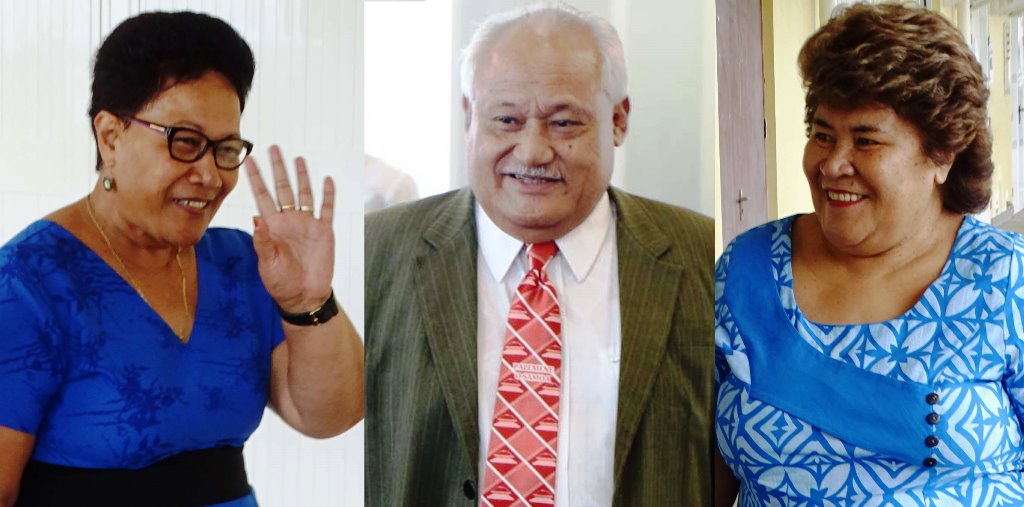Court
Speakers decision not to swear in Women MPs unconstitutional

By Lagi Keresoma
APIA, SAMOA – 10 MARCH 2022: The former Attorney General, Aumua Ming Leung Wai told the court today that the Speaker’s decision not to swear-in two women parliamentarians was “unlawful and unconstitutional.”
Aumua represented the applicants Aliimalemanu Alofa Tu’uau and Faagasealii Sapoa Feagiai in a legal challenge against the Parliament Speaker Papalii Li’o Taeu Masipa’u (Respondent) for refusing to swear them in as Members of Parliament.
The Applicants were seeking a coercive order from the Court against the Speaker to swear them in and they clarified their argument in three points.
One was whether the Speaker had valid or legal grounds to oppose the Applicants.
“No. The Respondent was given a chance to amend his notice of motion of opposition, but no valid grounds were given in the notice,” said Aumua.
Aumua said instead of an amendment, the Respondent’s counsel Leilani Tamati cited a case to justify the Respondent’s decision, yet the Respondent did not apply to be a party to that case. “So there is no legal ground to oppose the Applicants motion,” Aumua argued.
The second point was whether the decision not to swear-in the Applicants was unlawful.
Currently there are 4 women MPs after the general election, but the Court of Appeal had already ruled on the 10% and that there should be 6 women MPs.
“By not swearing-in the Applicants, the Respondent has deprived the Applicants of their rights to sit in Parliament proceedings and refusing to swear them in was unconstitutional, unlawful and discriminatory,” said Aumua.
The Applicants third argument was whether a coercive order can be issued against the Respondent.
“Whilst Parliament has a power to its own proceedings but when it comes to breach of human rights, the Court has the power to intervene and issue a coercive order,” said Aumua.
He then informed the Court that there are no valid or legal grounds to support the Respondents argument. “The Applicants should be sworn in now.”
Point of certainty
The Speakers counsel, Leilani Tamati pointed out that the Respondents decision not to swear-in the Applicants was based on uncertainty factors related to Article 44 of the Constitution.
She said the Respondent would rather have the Court decide on such uncertainty before a decision was made.
Senior Judge Vui Clarence Nelson asked Leilani to point out the exact uncertainty in Article 44.
According to Justice Nelson, Article 44 of the Constitution is very clear, that the women with the highest percentage of votes after the general and by-election should be sworn in as MPs.
Aumua took up the argument and said the only reference to “uncertainty” is referred to the period after the general election with all election petitions that followed.
Aumua said that counsel for the Respondent was “misguided.”
He then reference Article 44 as the point of certainty because it says 10% is the minimum number for women in Parliament, “and this is the point a decision should be decided on.”
“It was this point of certainty which prompted the Head of State to issue a writ on 29 November 2021 declaring the Applicants as MPs, yet the Respondent still refuses,” said Aumua.
He also pointed out should the Court rule against the Applicants, it means their seats in Parliament would be vacated.
Leilani referred to Toomata Norah Leota’s challenge of the interpretation of Article 44 which she tried to consolidate with the swearing-in proceedings.
She pointed out that the Respondent had no position regarding Article 44 except To’omata who was questioning its interpretation.
Justice Nelson however reminded Leilani that To’omata’s views were hers, but the Respondent took a position by opting not to swear -in the Applicants.
Chief Justice Satiu Simativa Perese then asked whether the Respondent would voluntarily swear-in the Applicants and Leilani said if the Court ruled that they are qualified.
The decision is reserved.



















